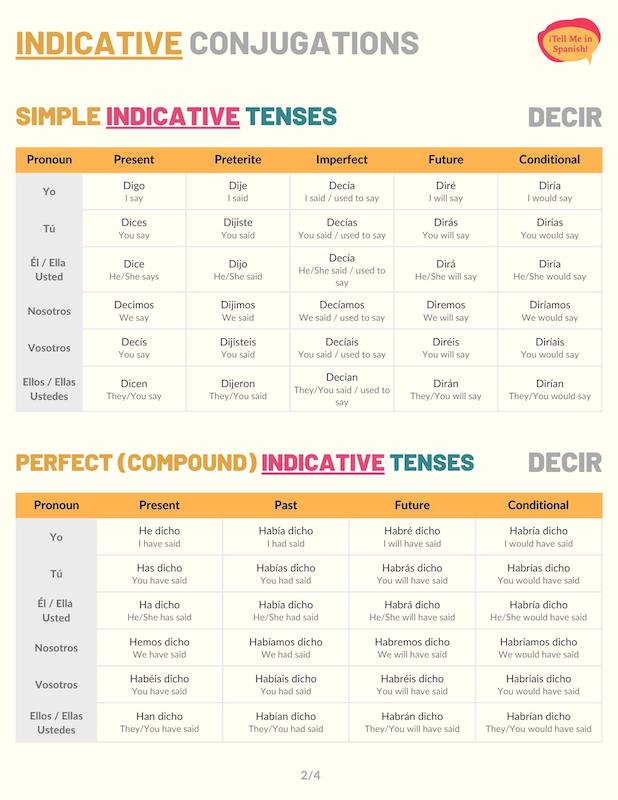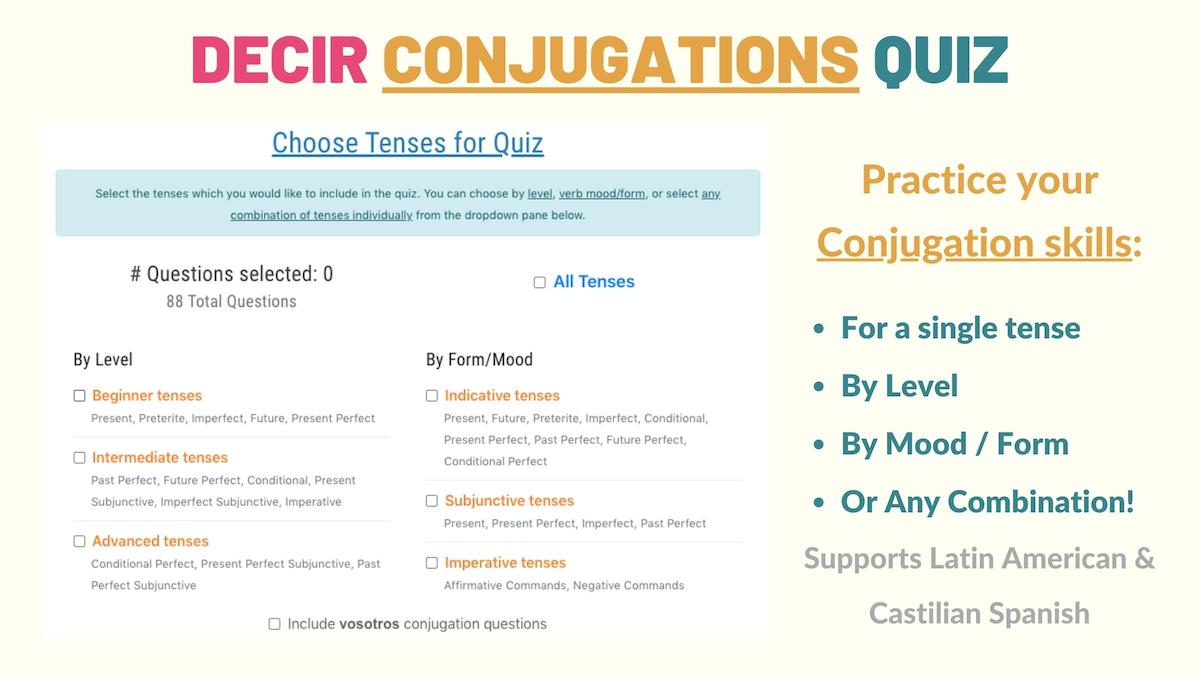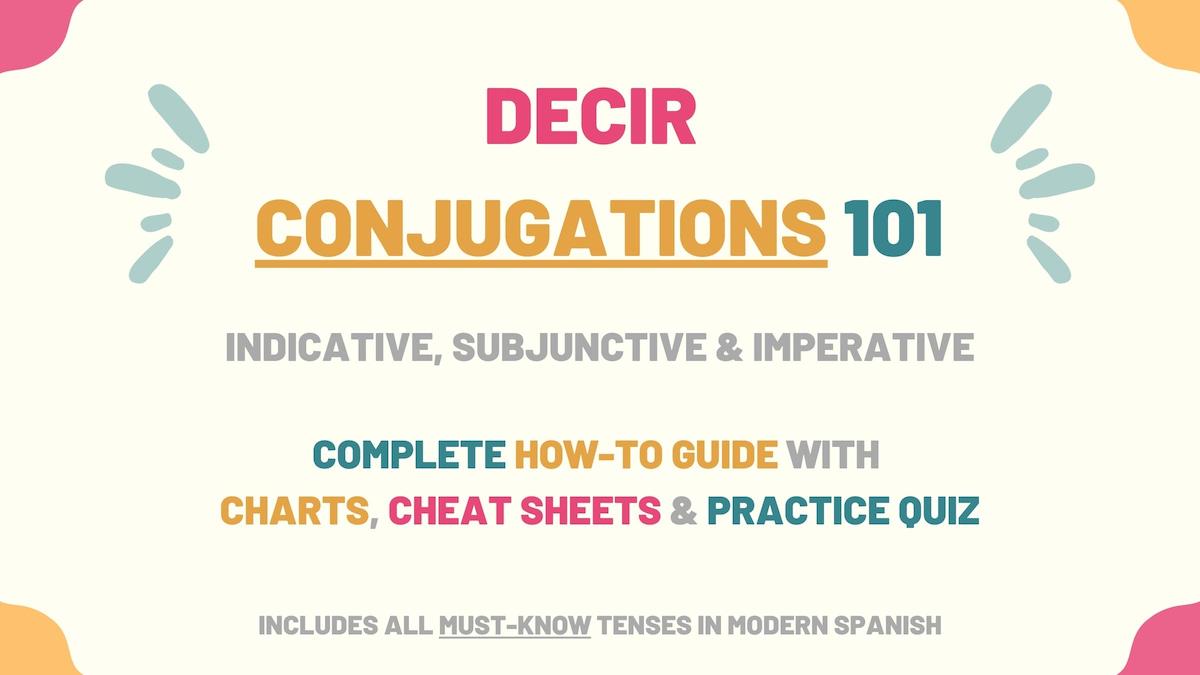Decir is one of the most basic -IR verbs in Spanish. However, this verb is highly irregular in all tenses. As a result, in this guide, we’ll review all decir conjugation charts so you learn how to conjugate this verb correctly.
Here is an overview of what you’ll learn:
- Decir Overview
- Indicative Tenses of Decir Conjugations
- Subjunctive Tenses of Decir Conjugations
- Imperative (Commands) of Decir Conjugations
- Uses & Examples
- Download Decir Conjugation Tables & Uses Cheat sheets
- Decir Conjugation Practice Quiz
Overview of Decir
| Verb Characteristic | Property |
|---|---|
| Verb Type | -IR |
| Irregular | Yes |
| Infinitive | Decir |
| Gerund (Present Participle) Form | Diciendo |
| Past Participle Form | Dicho |
| Synonyms | Contar, expresar, mencionar |
Irregularities:
- Present: dig only ‘yo’.
- Preterite: dij for all subject pronouns.
- Future & Conditional: dir for all subject pronouns.
- Present Subjunctive: dig for all subject pronouns.
- Imperfect Imperative: dij for all subject pronouns.
- Affirmative Imperative: di for ‘tú’, dig for ‘usted’ and ‘ustedes’
- Negative Imperative: dig for all subject pronouns.
Stem Changes: E to I
- Present indicative: dic only ‘tú’, ‘él’, ‘ella’, ‘usted’ and their plural forms.
Indicative Conjugations of Decir
Present tense
The conjugations of decir in the present tense have an E to I stem change for ‘tú’ and the third person singular and plural. Additionally, the conjugation for yo is formed with the irregular stem dig.
We use decir conjugated to the present indicative tense to talk about the things people say all the time or are currently saying. For instance: Yo digo que no hay que ir.
| Person | Conjugation | Translation |
|---|---|---|
| Yo | Digo | I say |
| Tú | Dices | You say |
| Él / Ella Usted | Dice | He/She says You (formal) say |
| Nosotros | Decimos | We say |
| Vosotros | Decís | You say |
| Ellos / Ellas Ustedes | Dicen | They say You (plural) say |
Preterite tense
The preterite conjugations of decir are all irregular. As shown in the conjugation chart below, we must use the stem dij to form the preterite tense. Use these conjugations to refer to things people said at a specific moment in time. For example: Ayer me dijiste otra cosa.
| Person | Conjugation | Translation |
|---|---|---|
| Yo | Dije | I said |
| Tú | Dijiste | You said |
| Él / Ella Usted | Dijo | He/She said |
| Nosotros | Dijimos | We said |
| Vosotros | Dijisteis | You said |
| Ellos / Ellas Ustedes | Dijeron | They said You (plural) said |
Imperfect tense
Decir is a regular verb in the past imperfect tense. Use the imperfect conjugations to refer to things people used to say repeatedly or when it’s unclear when something was said. For example: Mi mamá siempre nos decía que tuviéramos cuidado.
| Person | Conjugation | Translation |
|---|---|---|
| Yo | Decía | I said I used to say |
| Tú | Decías | You said You used to say |
| Él / Ella Usted | Decía | He/She said He/She used to say You (formal) said You (formal) used to say |
| Nosotros | Decíamos | We said We used to say |
| Vosotros | Decíais | You said You used to say |
| Ellos / Ellas Ustedes | Decían | They said They used to say You (plural) said You (plural) used to say |
Near future
Use the structure ir (present tense) + a + infinitive (in this case, ‘decir’) to form the near future tense. We use these decir conjugations to express that someone plans to say something in the near to immediate future. For example: Te voy a decir un secreto.
| Person | Conjugation | Translation |
|---|---|---|
| Yo | Voy a decir | I’m going to say |
| Tú | Vas a decir | You’re going to say |
| Él / Ella Usted | Va a decir | He/She is going to say You (formal) are going to say |
| Nosotros | Vamos a decir | We’re going to say |
| Vosotros | Vais a decir | You’re going to say |
| Ellos / Ellas Ustedes | Van a decir | They’re going to say You (plural) are going to say |
Future simple tense
The future conjugation of decir is irregular and must be formed with the stem dir. We use the future forms of this verb to explain that someone will say something at some point in the future. Algún día te diré qué pasó.
| Person | Conjugation | Translation |
|---|---|---|
| Yo | Diré | I will say |
| Tú | Dirás | You will say |
| Él / Ella Usted | Dirá | He/She will say You (formal) will say |
| Nosotros | Diremos | We will say |
| Vosotros | Diréis | You (formal) will say |
| Ellos / Ellas Ustedes | Dirán | They will say You (plural) will say |
Conditional tense
The conditional conjugations of decir are formed with the irregular stem dir. We use ‘decir’ conjugated to the conditional tense to talk about what people would say if some circumstances were met. These forms are also used to make hypotheses about what people would say.
Here is an example: ¿Por qué nos dirían eso?
| Person | Conjugation | Translation |
|---|---|---|
| Yo | Diría | I would say |
| Tú | Dirías | You would say |
| Él / Ella Usted | Diría | He/She would say You (formal) would say |
| Nosotros | Diríamos | We would say |
| Vosotros | Diríais | You would say |
| Ellos / Ellas Ustedes | Dirían | They would say You (plural) would say |
Present perfect tense
The Spanish present perfect of ‘decir’ is conjugated with the formula haber in the present tense + dicho (past participle). Use these conjugations to talk about the things someone has or hasn’t said. For instance: Sofía no me ha dicho nada.
| Person | Conjugation | Translation |
|---|---|---|
| Yo | He dicho | I have said |
| Tú | Has dicho | You have said |
| Él / Ella Usted | Ha dicho | He/She has said You (formal) have said |
| Nosotros | Hemos dicho | We have said |
| Vosotros | Habéis dicho | You have said |
| Ellos / Ellas Ustedes | Han dicho | They have said You (plural) have said |
Take Note: Decir is one of the few Spanish verbs with an irregular past participle form.
Past perfect
Conjugate decir to the past perfect tense to talk about what someone had said before some other reference point in the past. ¿Por qué no me habías dicho? To conjugate the past perfect, use the imperfect form of ‘haber’ and the past participle form of ‘decir’.
| Person | Conjugation | Translation |
|---|---|---|
| Yo | Había dicho | I had said |
| Tú | Habías dicho | You had said |
| Él / Ella Usted | Había dicho | He/She had said You (formal) had said |
| Nosotros | Habíamos dicho | We had said |
| Vosotros | Habíais dicho | You had said |
| Ellos / Ellas Ustedes | Habían dicho | They had said You (plural) had said |
Future perfect
The future perfect tense of ‘decir’ refers to things someone will have said by or before a certain moment in the future. We also use these forms to talk about what someone might have said. For example: ¿Qué crees que le habrán dicho a Betty?
| Person | Conjugation | Translation |
|---|---|---|
| Yo | Habré dicho | I will have said |
| Tú | Habrás dicho | You will have said |
| Él / Ella Usted | Habrá dicho | He/She will have said You (formal) will have said |
| Nosotros | Habremos dicho | We will have said |
| Vosotros | Habréis dicho | You will have said |
| Ellos / Ellas Ustedes | Habrán dicho | They will have said You (plural) will have said |
Conditional perfect
Use decir conjugated to the Spanish conditional perfect tense to talk about what someone would have said if a past condition had been met. These conjugations are also used to make hypotheses about what someone said in the past.
For example: Si me hubieras preguntado, te habría dicho.
| Person | Conjugation | Translation |
|---|---|---|
| Yo | Habría dicho | I would have said |
| Tú | Habrías dicho | You would have said |
| Él / Ella Usted | Habría dicho | He/She would have said You (formal) would have said |
| Nosotros | Habríamos dicho | We would have said |
| Vosotros | Habríais dicho | You would have said |
| Ellos / Ellas Ustedes | Habrían dicho | They would have said You (plural) would have said |
Progressive tenses
With the verb ‘decir’, the progressive tenses (such as the Spanish present progressive) allow you to refer to the things people are saying at the moment of speaking. Or, if used in the past forms (preterite and imperfect), to express that a past action was in progress when someone was saying something.
For example: Le estaba diciendo algo a Tania cuando Jim nos interrumpió.
| Progressive Tense | Formula | Translation Example |
|---|---|---|
| Present | Estar (present) + diciendo | I am saying |
| Preterite | Estar (preterite) + diciendo | You were saying |
| Imperfect | Estar (imperfect) + diciendo | He was saying |
| Future | Estar (future) + diciendo | We will be saying |
| Conditional | Estar (conditional) + diciendo | They would be |
Take Note: The present participle of decir (diciendo) has an E to I stem change. Other verbs also have these vocalic changes. You can see them in this guide to present participles in Spanish.
Decir Subjunctive Conjugations
The Spanish subjunctive form refers to wishes, requests, suggestions, expectations, doubts, or hypothetical situations. Below are decir conjugation charts for the most common subjunctive tenses.
Present subjunctive
Decir present subjunctive conjugation is irregular. Use the stem dig to form this tense. In Spanish, we use the subjunctive conjugations of ‘decir’ to request or wish someone says or doesn’t say something. For instance: Espero que ustedes no digan nada.
| Person | Conjugation | Translation |
|---|---|---|
| Yo | Diga | I say |
| Tú | Digas | You say |
| Él / Ella Usted | Diga | He/She says You (formal) say |
| Nosotros | Digamos | We say |
| Vosotros | Digáis | You say |
| Ellos / Ellas Ustedes | Digan | They say You (plural) say |
Present perfect subjunctive
Haber in the present subjunctive + dicho is the structure we use to build the present perfect subjunctive of ‘decir’. We use these conjugations to wonder or wish that someone has already said something to another person. ¿Qué crees que les hayan dicho?
| Person | Conjugation | Translation |
|---|---|---|
| Yo | Haya dicho | I have said |
| Tú | Hayas dicho | You have said |
| Él / Ella Usted | Haya dicho | He/She has said You (formal) have said |
| Nosotros | Hayamos dicho | We have said |
| Vosotros | Hayáis dicho | You have said |
| Ellos / Ellas Ustedes | Hayan dicho | They have said You (plural) have said |
Imperfect subjunctive
When conjugated to the imperfect subjunctive, decir refers to past requests, suggestions, and wishes someone had about what a person says. Te pedí que no dijeras nada. These decir conjugations are also irregular and are formed with the stem dij.
The imperfect subjunctive has two conjugation models depending on which type of Spanish you’re using:
Latin American Spanish version
| Person | Conjugation | Translation |
|---|---|---|
| Yo | Dijera | I said |
| Tú | Dijeras | You said |
| Él / Ella Usted | Dijera | He/She said You (formal) said |
| Nosotros | Dijéramos | We said |
| Ellos / Ellas Ustedes | Dijeran | They said You (plural) said |
Note: The conjugation chart above doesn’t include the conjugation for vosotros as this pronoun is not used in Latin American Spanish.
Castilian Spanish version
| Person | Conjugation | Translation |
|---|---|---|
| Yo | Dijese | I said |
| Tú | Dijeses | You said |
| Él / Ella Usted | Dijese | He/She said You (formal) said |
| Nosotros | Dijésemos | We said |
| Vosotros | Dijeseis | You said |
| Ellos / Ellas Ustedes | Dijesen | They said You (plural) said |
Past perfect subjunctive
In the past perfect subjunctive, decir expresses that someone would have said something if a past circumstance was met. Additionally, these conjugations also refer to regrets or hypothetical outcomes if someone had said something.
For example: Ojalá me hubieras dicho antes.
| Person | Conjugation | Translation |
|---|---|---|
| Yo | Hubiera dicho | I had said |
| Tú | Hubieras dicho | You had said |
| Él / Ella Usted | Hubiera dicho | He/She had said You (formal) had said |
| Nosotros | Hubiéramos dicho | We had said |
| Vosotros | Hubierais dicho | You had said |
| Ellos / Ellas Ustedes | Hubieran dicho | They had said You (plural) had said |
Decir Imperative Conjugations
In Spanish, the imperative is the mood we use to give commands to someone.
Affirmative commands
The affirmative imperative conjugations of decir use the stem di for all subject pronouns, except ‘vosotros’. Use ‘decir’ affirmative commands to order people to say something. For example: Dinos qué pasó.
| Person | Conjugation | Translation |
|---|---|---|
| Tú | Di | Say |
| Usted | Diga | Say |
| Vosotros | Decid | Say |
| Ustedes | Digan | Say |
Negative commands
As shown in the conjugation chart below, decir is an irregular verb in the negative imperative. Use these types of commands to order someone not to say something. For instance: ¡No le digas nada!
| Person | Conjugation | Translation |
|---|---|---|
| Tú | No digas | Don’t say |
| Usted | No diga | Don’t say |
| Vosotros | No digáis | Don’t say |
| Ustedes | No digan | Don’t say |
Meanings of Decir & Examples
Now that you’ve learned how to conjugate decir in Spanish, here are some examples of how to use this verb.
In Spanish, decir is a transitive verb. This means you need to add additional information, such as what someone says or to whom it’s said. Decir can be translated as ‘to say’ or ‘to tell’.
(Indirect object pronoun) + [decir conjugated] + (complement)
Te juro que yo no le dije nada.
I swear that I didn’t say anything to her.
Desearía que no hubieras dicho nada.
I wish you hadn’t said anything.
Take Note: Decir is a verb that takes indirect object pronouns in Spanish. Be aware that the position of the pronoun may vary depending on the tense you’re using. You can check these rules here.
Download Decir Conjugation Tables & Uses Cheat sheets

Decir is a highly irregular verb in Spanish. I’ve created a PDF you can download with all the decir conjugation tables as well as meanings and uses.
Practice Quiz: Decir Conjugation

Now that you’ve learned how to conjugate decir in Spanish, you can challenge yourself and practice all the regular and irregular tenses for this verb by taking the decir conjugation practice quiz.



